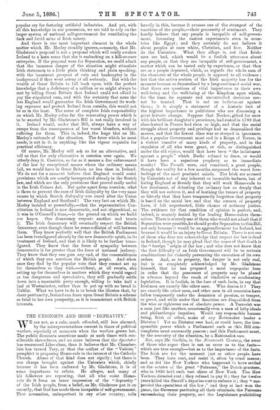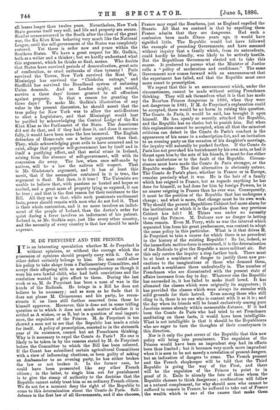THE UNIONISTS AND IRISH DEPRAVITY."
'UTE are not, as a rule; much offended, still less alarmed,
V by the misrepresentations current: in times of political warfare, especially at moments when the warfare grows hot. The public discounts assertions made- at such times with oon- siderable shrewdness, and no more believes that the Spectator has renounced Liberalism, than it believes that Mr. Chamber- lain has turned Tory, or that the , author of the " Vatican " pamphlet is proposing Home-rule in the interestof the-Catholic Church. Abuse of that kind' does- not signify ; but there •is one charge brought against the Unionists which, chiefly because it has been endorsed by Mr. Gladstone, it -is. of some importance to refute. He alleges,. and -many of his followers are repeating, that all who- resist Home- rule do. it from an inner impression of .the "depravity " of the Irish. people, from a belief,,aa Mr; Gladstone put it an recently, That God has made them incapable of self-government. That accusation, unimportant in any other country, tells heavily in this, because it arouses one of the strongest of the emotions of the people,—their generosity of sentiment. They hardly believe that any people is incapable of self-govern- ment, favouring the rashest experiments even in satin- tries like Egypt ; and they certainly do not believe it
about peoples at once white, Christian, and free. Neither do the Unionists. What they allege is, not that Irish- men are bad, which would be a foolish utterance about any people, or that they are incapable of self-government, a matter whioh can be tested only by experience, or that -they are as a people depraved, which, as regards the whole sum of the character of the whole people, is opposed to all evidence ; but that the active section of the Irish majority has for the moment become so demoralised by a long-continued social, war, that there are questions of vital importance to their own well-being and the well-being of the Kingdom upon which, for the time, its separate and uncontrolled decisions can- not be trusted. That is not an indictment against them ; it is simply a statement of a historic- fact of the highest importance to politicians who are discussing a great historic change. Suppose that Necker, gifted for woe with his brilliant daughter's prescience, had stated in 1780 that olass-hatred in France had risen so high, and that the ,social struggle about property and privilege had so demoralised the masses, and that the lowest class was so steeped in ignorance, that a popular Government must end in a Reign of Terror, in a violent transfer of many kinds of property, and in the expulsion of all who were great, or rich, or distinguished under the old re'ginte, would that have been " the indictment against a people" which Burke refused to draw-, or would it have been a saeacious prophecy as to immediate results? The French were, and remained, a great people, though the reality for a few months surpassed the worst fore- bodings of the most pessimist minds. The Irish are accused by Unionists not of any inherent or incurable badness, but of hating England so fiercely that they will work Home-rule to her detriment, of detesting the ordinary law so deeply that they will not enforce-it, and of loathing the tenure of property so bitterly that they have temporarily forgotten that property is based on the moral law, and that the owners of property ,have, if left unprotected, little chance of ordinary justice. ' The evidence for that condition of opinion is perfect, and, indeed, is scarcely denied, by the leading. Home-rulers them- selves. There is scarcely one of them who would not admit that if
Separation were possible,he should prefer Separation to thisaill, not only because it would be an aggrandisement for Ireland, but because it would be an injury to Great Britain. There is not one :of them who does not acknowledge that respect for law is dead in Ireland, though he may plead that the cause of that death is the " foreign " origin of the law ; and who does note know that the first difficulty of an Irish Government will be to• restrain combinations for violently preventing the execution of its own orders. And, as to property, the danger is not only real, but is so completely acknowledged by Mr. Gladstone himself, that he has proposed a most unpopular loan in order that the possessors of property may be placed in advance beyond the reach of vindictive or confiscating legislation. It is foolish, in- the face of such facts, to say that
Irishmen are exactly like other-men. Who denies it They are exactly like other men, and other men in all countries have fallen temporarily under the dominion of passion, or temper, .or-greed, and while under that dominion are disqualified from the wise or righteous use of absolute power. A Terrorist was , a man just like another, occasionally even a man of lofty ideals and philanthropic impulses. Would any responsible human being, Irish or other, make of any Nationalist leader a ' Dictator ? Yet no Dictator ever had, or could have, the irre- sponsible- power which. a Parliament such as this Bill con- ; templates must- necessarily possess ; and this Parliament must, by the necessity of the situation, be a-Nationalist one.
But, says Mr. Godkin; in the- Nineteenth Century, -the error of those. who argue thus is not an error as to- the facts— which- are true enough—but as to the importance of the fasts. The Irish- are for the -moment jest as other people, have been. 'They hate- rent,.and resist it, often by cruet means; and so did the New Yorkers who happened to have settled on- the estates of the great "Patroons," the Dutele grantees, whoin 1830 held such vast slices of New York. The New Yorkersidetested.rent ; they refused to -pay it ; they for twelve years killed the Sheriff's deputies sent to enforce it; they " sua- pendedthe operations of the law ;" -and they at last won, the game, the ,Governor pardoningiall their criminals, the Patroclus surrendering their property, and the Legislature prohibiting
all leases longer than twelve years. Nevertheless, New York State governs itself very well, and life and property are secure. Similar scenes occurred in the South after the close of the great war, the Ku Klux Klan behaving very much like the National League, until the self-government of the States was completely restored. Yet there is order now and peace within the Southern States. We have a great respect for Mr. Godkin, both as a writer and a thinker ; but we hardly understand what this argument, which he thinks so final, means. Who doubts that States have survived periods of demoralisation, great acts of confiscation, or cruel outbreaks of class tyranny ? Paris survived the Terror, New York survived the Rent War, Mississippi has survived the " Chisholm outrage," and Sheffield has survived the Broadhead system of enforcing Union demands. And so London might, and would, survive a three days' license granted to all offenders against property. Is that a reason for granting the three days ? To make Mr. Godkin's illustration of any value in the present discussion, he should assert that the true policy for New York was to allow the anti-Renters to elect a Legislature, and that Mississippi would best be pacified by acknowledging the Central Lodge of the Ku Klux Klan as the Parliament of the State. The Americans did not do that, and if they had done it, and done it success- fully, it would have been none the less immoral. The English defenders of Home-rule use a better argument than that. They, while acknowledging great evils to have occurred and to exist, allege that popular self-government has by itself and in itself a purifying effect, and that social crime in Ireland, arising from the absence of self-government, will with its concession die away. The law, when once self-made by natives, will be a law the natives will respect. That is Mr. Gladstone's argument, and it has at least this merit, that if the assumption contained in it is true, the argument is final. But then, is it true ? The Unionists are unable to believe that, with passions so heated and hopes so excited, and a great mass of property lying so exposed, it can be true ; and that is the first reason for their resistance to the Bill. All they say is that, while such passionate excitement lasts, power should remain with men who do not feel it. That is their whole contention, and it no more involves an indict- ment of the people of Ireland, than the doctor's order for quiet during a fever involves an indictment of his patient. Ireland is, as Mr. Godkin says, just like every other country, and the necessity of every country is that law should be made supreme.



































 Previous page
Previous page